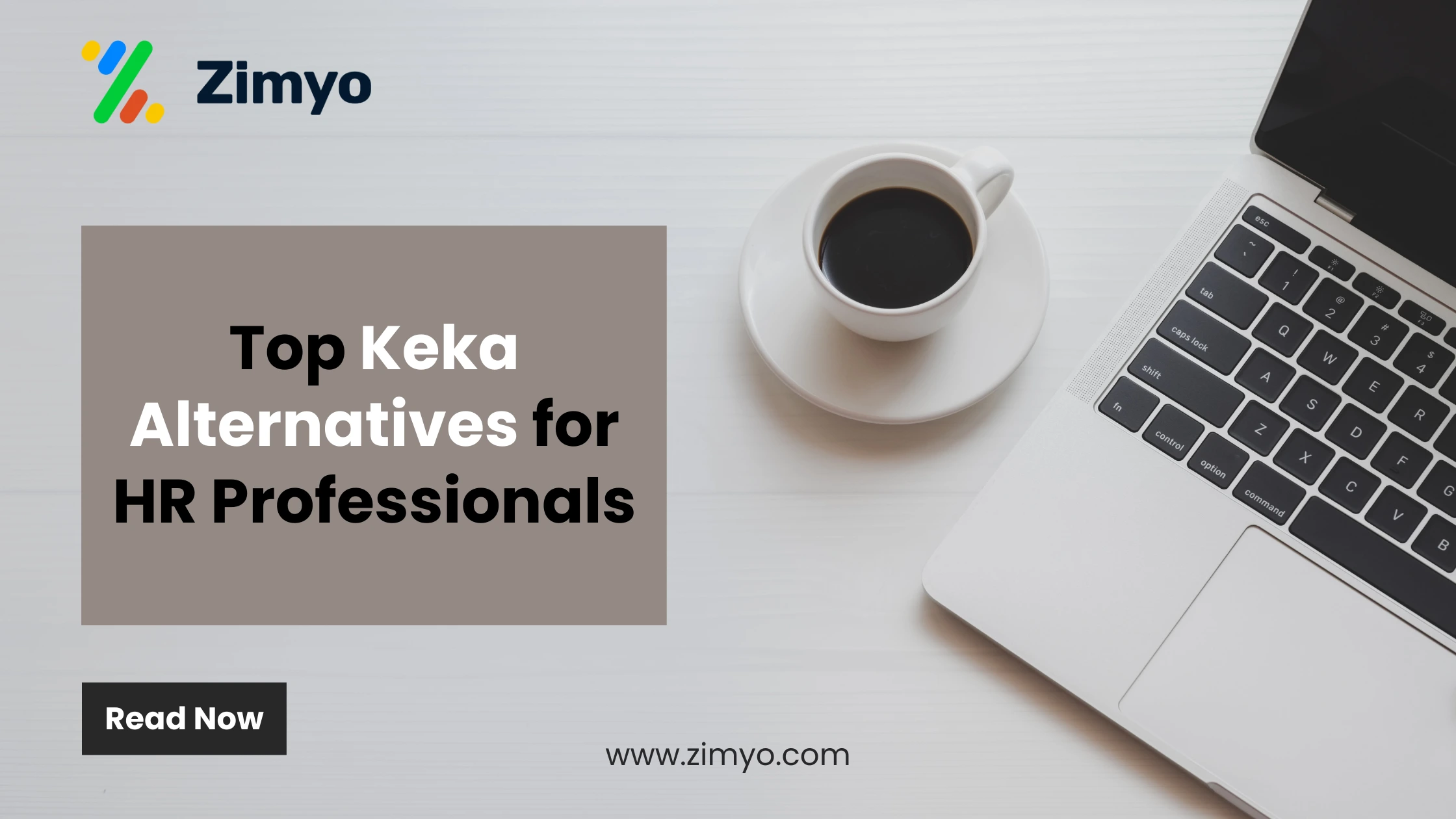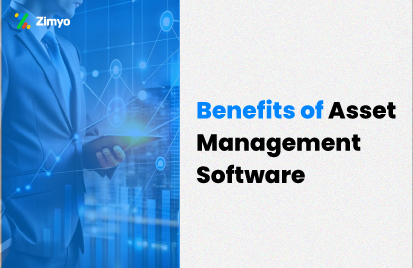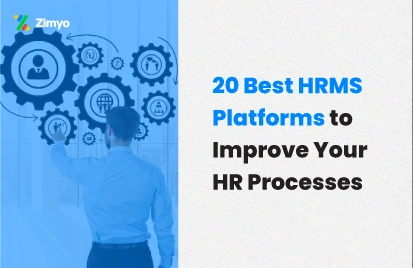Managing people in a small business is never easy. From payroll and compliance to employee engagement and performance tracking, HR responsibilities often pile up quickly. This is where HR Analytics Software and modern HR systems for small businesses come into play.
Today, small companies, startups, and growing organizations are no longer limited to spreadsheets or manual processes. Instead, they can rely on the Best HR Analytics Software for Small Businesses to analyze workforce trends, improve productivity, and simplify decision-making. These tools act as an all-in-one human resource management software for small business, combining payroll management software for small business, HRMS human resource management system, and HRIS system features into easy-to-use platforms.
What makes these solutions even more powerful is that they are designed to fit the budget and scale of smaller teams. Whether you’re looking for HR software for startups, HR and payroll software for small business, or simply the best small business HR software to handle compliance, these platforms deliver flexibility, automation, and actionable insights.
In this guide, we’ll explore the 10 Best HR Analytics Software for Small Businesses in the USA. For each software, you’ll get:
- A quick history and overview of what it does.
- It’s uniquely different features that stand out.
- A clear table of pros and cons to help you decide.
By the end, you’ll have a clear picture of which HR Software for Small Businesses or HRIS for small business fits your needs best.
List of the Best HR Analytics Software for Small Businesses
Following is the List of the Best HR Analytics Software for Small Businesses:
- Zimyo
- BambooHR
- Rippling
- Gusto
- intelliHR
- ChartHop
- Crunchr
- Visier People
- Microsoft Power BI
- Zoho Analytics
Now, let’s throw light on each of the HR Analytics Software one by one.
Best HR Analytics Software for Small Businesses: Explained in Detail
1. Zimyo
Zimyo was founded in 2018 in India with the goal of simplifying human resource management for small and mid-sized companies. Over the years, it has expanded globally, including the U.S. market, and is now recognized as one of the Best HR Analytics Software For Small Businesses. Zimyo provides an all-in-one HRMS human resource management system that includes payroll management software for small business, performance tracking, attendance, engagement, and people analytics. It is designed to be a complete HRIS system and HR Software for Small Businesses, helping startups and growing companies manage their workforce effectively.
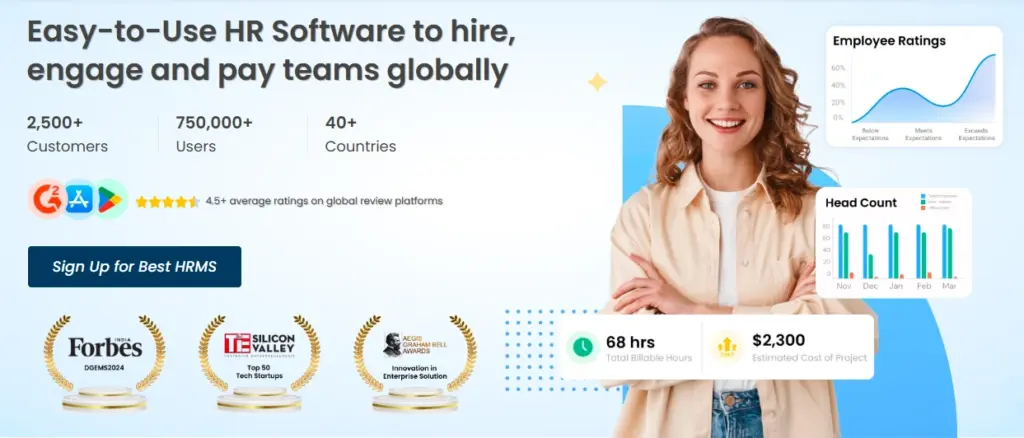
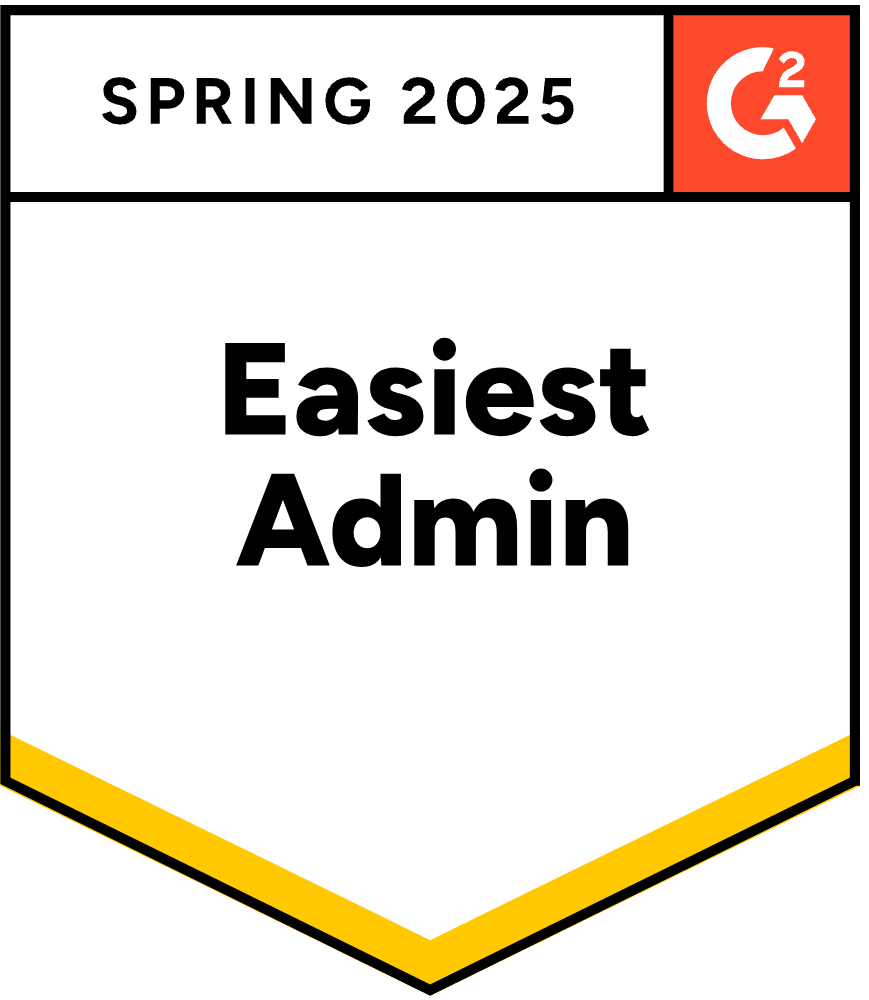
Uniquely Different Features
- Pre-built HR dashboards and analytics for attrition, payroll, performance, and employee satisfaction.
- A complete HR and payroll software for small business with compliance, salary structures, and tax management.
- Employee self-service mobile app for leave, attendance, and engagement surveys.
- Built-in employee engagement features like surveys, polls, and recognition tools, rare among many HR software for small companies.
- Affordable pricing plans designed specifically for startups and SMEs, making it one of the best small business HR software solutions.
Pros and Cons
Pros | Cons |
Full-suite human resources software for small business covering HR, payroll, and analytics. | Smaller global brand recognition compared to giants like BambooHR or Rippling. |
Strong people analytics and dashboards built-in. | May require training for HR teams new to HR technology. |
Mobile app enhances accessibility for employees and managers. | Some advanced enterprise-level integrations may be limited. |
Very cost-effective, making it ideal as HR software for startups. | Relatively new compared to long-standing HRIS providers. |
2. BambooHR
BambooHR was founded in 2008 in Utah by Ben Peterson and Ryan Sanders. It was designed as human resources software for small business, focusing on making HR systems for small businesses simple, intuitive, and people-focused. Over time, BambooHR became one of the Best HR Analytics Software For Small Businesses, providing tools for tracking applicants, managing benefits, running payroll, and creating HR reports in one easy system.
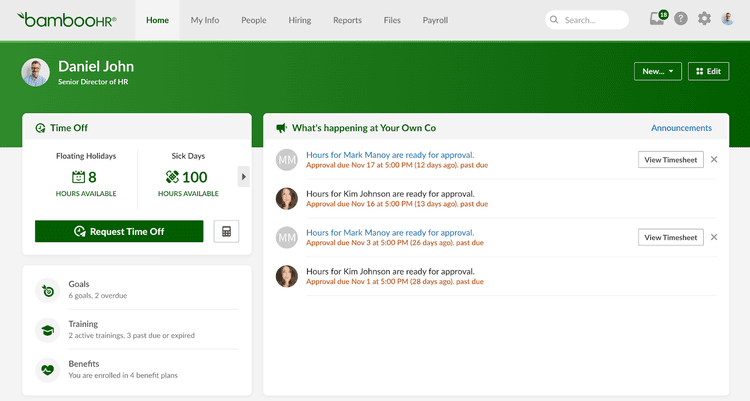
Uniquely Different Features
- Benefit History Table: A searchable log of benefit changes that tracks event type, date, time, and who made updates.
- Timesheet Change History: Transparent audit trail of every timesheet edit, boosting accountability.
- Payroll History: Interactive records of payroll cycles, complete with filters, timelines, and exportable data.
- Strong emphasis on user-friendly dashboards, making HR analytics accessible for HR software for small companies.
Pros and Cons
Pros | Cons |
Very easy-to-use HR Software for Small Businesses. | More expensive than some budget tools. |
Strong HR analytics with dashboards, applicant tracking, and benefit tracking. | Benefits and payroll features not as advanced as some competitors. |
Clear audit trails support compliance and transparency. | Predictive analytics less advanced compared to larger HRMS platforms. |
3. Rippling
Rippling was founded in 2016 in San Francisco by Parker Conrad and Prasanna Sankar. It started as a solution to combine HR, IT, and finance into one integrated HRIS system. Today, Rippling is widely used as HR and payroll software for small business, offering a smooth experience that unifies HRMS, payroll management software for small business, and IT device management into one powerful platform.
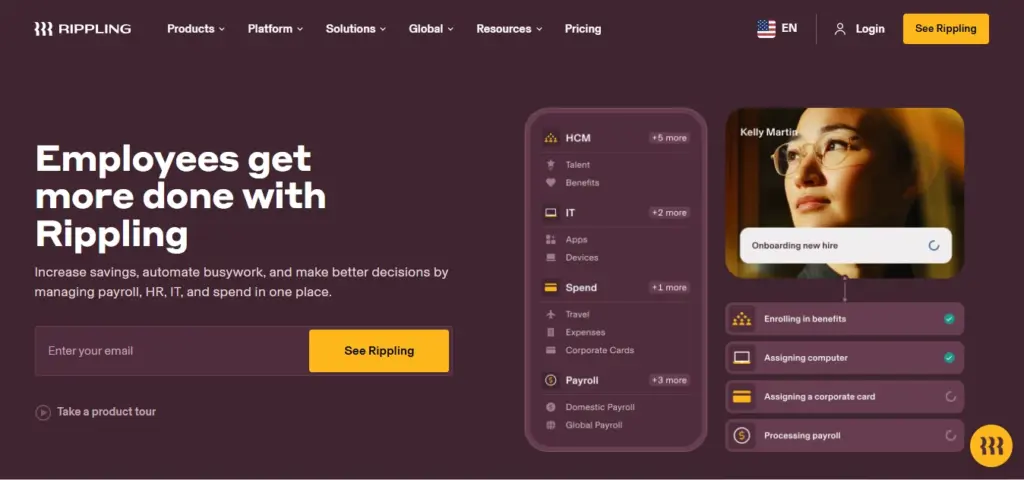
Uniquely Different Features
- A fully unified system combining HR, payroll, IT, expenses, and benefits under one HRMS human resource management system.
- Over 500 app integrations connected to a single employee record.
- Mobile app for HR, payroll, and employee self-service on the go—ideal for startups and remote teams.
- Automated workflows and more than 150 pre-built HR analytics reports with no-code editing.
Pros and Cons
Pros | Cons |
Full-suite HRIS system that unites HR, payroll, and IT in one place. | Doesn’t integrate with very large HCM platforms like SAP or Oracle. |
Huge integration library with 500+ apps. | Can feel complex for very small companies or first-time HR software users. |
Intuitive automation and customizable HR analytics reports. | Limited support hours, no 24/7 live assistance. |
Mobile-friendly and great for HR software for startups. | Slightly higher pricing compared to basic HR systems for small businesses. |
Fact: According to a 2025 report by Biz4Group, 65% of small businesses in the United States currently utilize HR software, with 28% actively evaluating new HR tools. This indicates a significant trend toward the adoption of HR analytics solutions to streamline human resource management processes.
4. Gusto
Gusto was launched in 2011 in San Francisco as a simple payroll platform for startups and small businesses. Over the years, it expanded into a full HR Software for Small Businesses, offering payroll management software for small business, benefits, onboarding, and compliance. Today, Gusto is recognized as one of the Best HR Analytics Software For Small Businesses because it provides HR analytics in payroll, tax filings, and employee benefits in an easy-to-use package.
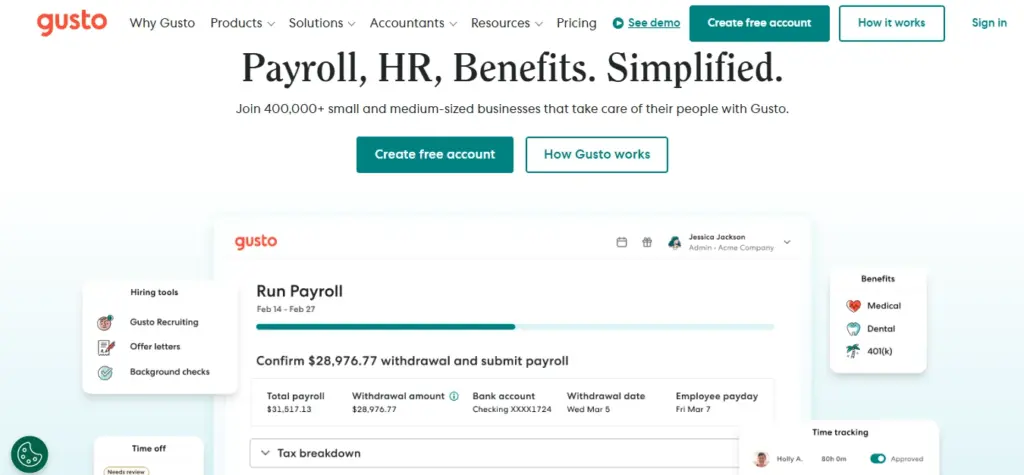
Uniquely Different Features
- Automatic payroll tax filing in all 50 U.S. states; rare for HR software for small companies.
- Easy-to-use benefits enrollment integrated with payroll management software for small business.
- Financial wellness tools for employees such as savings accounts and early wage access.
- Strong compliance support specifically for U.S. small businesses.
Pros and Cons
Pros | Cons |
Very simple and intuitive HR Software for non-HR experts. | Limited global capabilities (mostly U.S.-focused). |
Integrated payroll management software for small business with tax compliance. | Advanced analytics less robust compared to specialized HRIS system tools. |
Great for startups and small teams needing HR and payroll software for small business. | Benefits options limited outside major states. |
5. intelliHR
intelliHR was founded in Australia in 2014, focusing on making data-driven people management affordable for small and mid-sized businesses. It later entered the U.S. market as a cost-effective HR Analytics Software. Today, it’s known as one of the best small business HR software solutions for performance tracking, engagement analytics, and compliance.
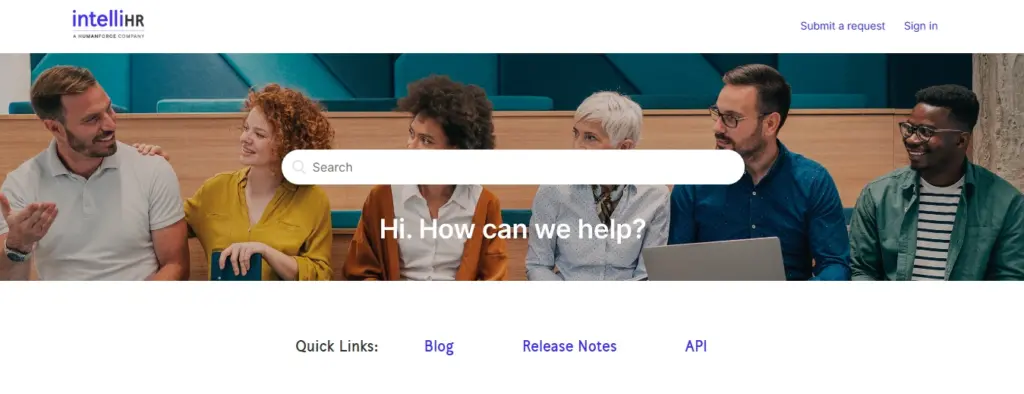
Uniquely Different Features
- Built-in continuous performance management system with real-time feedback.
- Sentiment analysis from employee surveys and check-ins, unique for HR software for startups.
- Very affordable per-employee pricing model, making it a budget-friendly human resource management software for small business.
Pros and Cons
Pros | Cons |
Cost-effective and scalable HR systems for small businesses. | Not as feature-rich for payroll compared to full HR and payroll software for small business. |
Strong analytics in performance and engagement. | Smaller brand presence compared to global players. |
Easy adoption for startups entering HR technology. | Lacks deep integrations available in bigger HRIS system platforms. |
6. ChartHop
ChartHop was founded in 2018 in New York. It was built around the idea of visualizing organizational data for small and mid-sized teams. As an HRIS for small business, it focuses on people analytics, diversity data, and headcount planning, making it a top choice for HR software for small companies that want clarity in team structures.
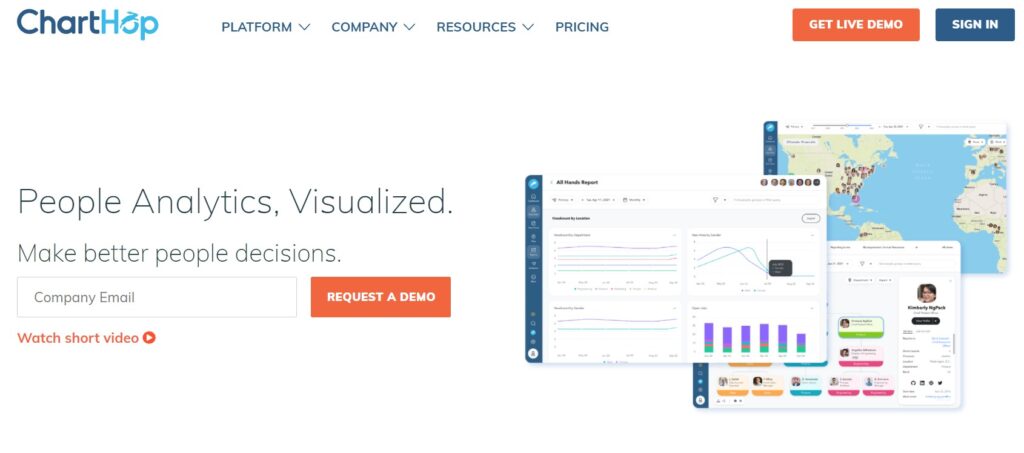
Uniquely Different Features
- Advanced org chart visualization with real-time HR data.
- “What-if” modeling for headcount planning and restructuring.
- Diversity dashboards that track gender, pay, and representation in a visual format.
Pros and Cons
Pros | Cons |
Best HR system for organizational mapping and planning. | Limited payroll management software for small business support. |
Diversity and inclusion analytics built in. | Less suited for startups that only need basic HRIS system functions. |
Unique “what-if” workforce planning models. | May require integration with other HR Software for full HRMS functionality. |
7. Crunchr
Crunchr was founded in the Netherlands and quickly gained traction in the U.S. as a specialized HR Analytics Software. It is widely used by small businesses and mid-sized companies that want advanced insights into workforce diversity, pay equity, and strategic planning.
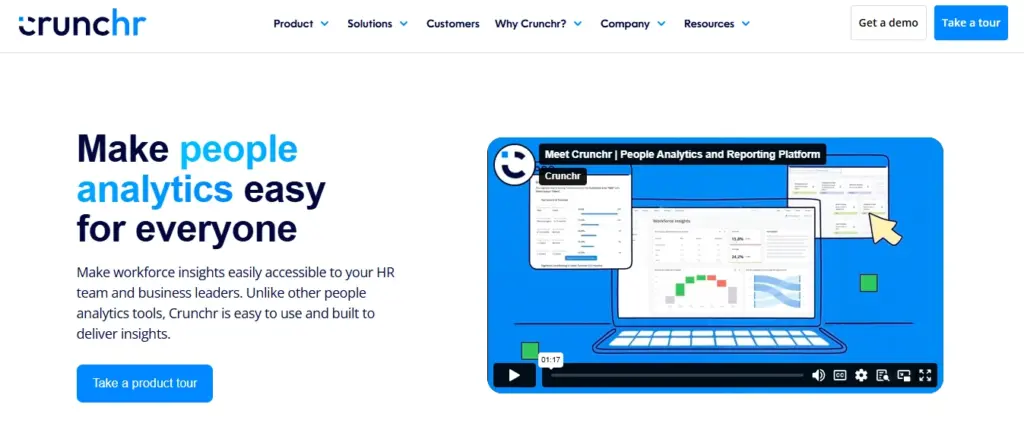
Uniquely Different Features
- Advanced DEI and pay equity analytics, unique compared to other HR software for small companies.
- Predictive workforce modeling with scenario-based planning.
- Data storytelling visuals designed for leadership presentations.
Pros and Cons
Pros | Cons |
Strong DEI and workforce equity tools, rare in human resource management software for small business. | Not a complete HRMS human resource management system—needs integration. |
Visual storytelling makes HR analytics more accessible. | Higher learning curve for startups. |
Predictive models enhance workforce planning. | May be costlier than basic best small business HR software. |
8. Visier People
Visier was founded in 2010 in Canada and grew into a global leader in people analytics. Visier People is its core product and is widely known as an advanced HR Analytics Software used by HR software for startups, small businesses, and large enterprises alike.
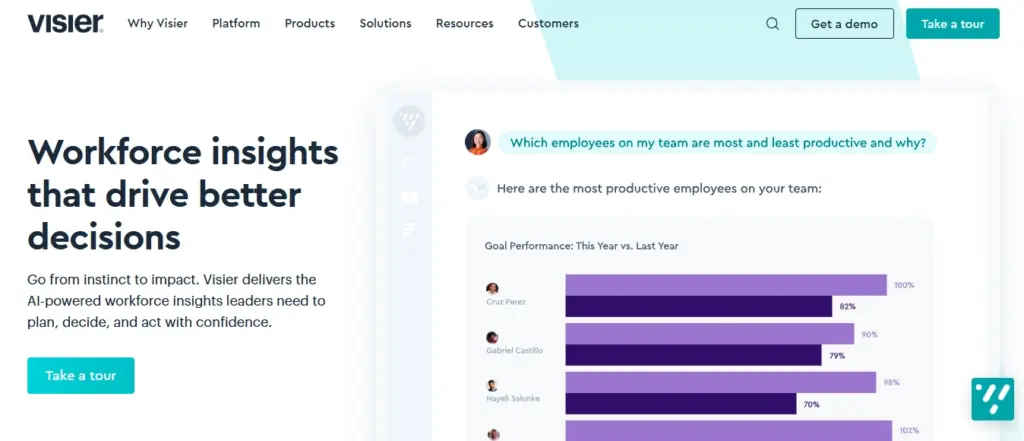
Uniquely Different Features
- Attrition forecasting and predictive analytics for turnover.
- Pre-built analytics templates specifically for HRIS for small business.
- External benchmarking against industry data, not just internal HR system data.
Pros and Cons
Pros | Cons |
One of the most advanced HR technology tools for predictive analytics. | Can be expensive for small teams. |
Pre-built reports and dashboards save time. | Less budget-friendly than simpler HR software for small companies. |
Strong benchmarking against competitors. | Requires strong data readiness for best use. |
9. Microsoft Power BI
Microsoft Power BI was launched in 2015 as a business intelligence tool. While not originally made as HR Software, many small businesses use it as HR analytics software by integrating it with HR systems for small businesses and HRMS platforms.
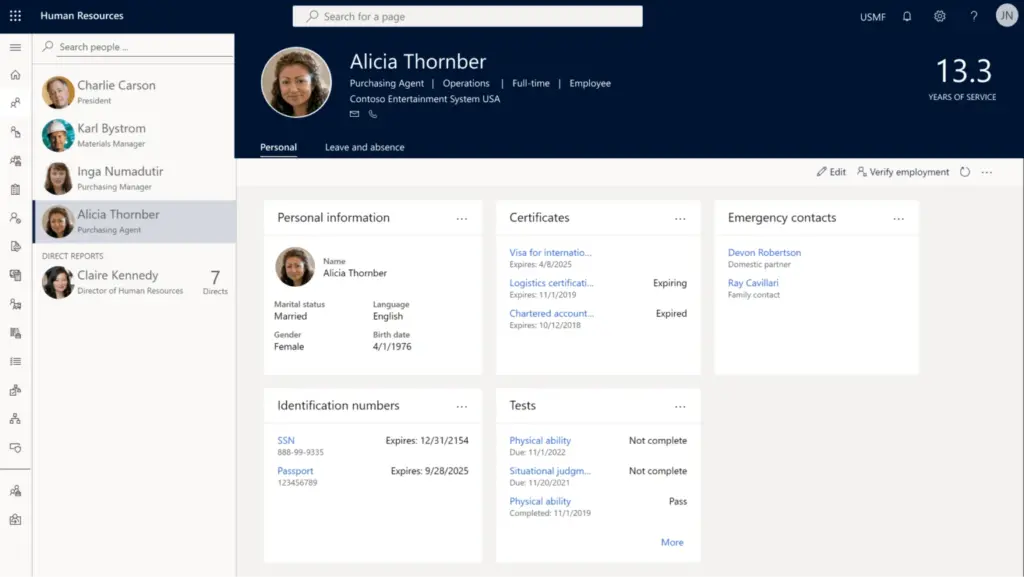
Uniquely Different Features
- Natural-language Q&A queries on HR data.
- AI-driven visualizations and forecasting tools.
- Extremely customizable dashboards for any HRIS system data.
Pros and Cons
Pros | Cons |
Very flexible and customizable for HR Software for Small Businesses. | Not a dedicated HRIS for small business—requires setup. |
Affordable compared to specialized HR analytics software. | Steeper learning curve for HR teams without analytics background. |
Integrates easily with Microsoft 365 ecosystem. | Relies heavily on integrations with other human resources software for small business. |
Fact: TriNet highlights that implementing HR analytics enables small businesses to make data-driven decisions that can lead to improved employee engagement and retention. By analyzing workforce data, businesses can identify trends and areas for improvement, fostering a more satisfied and stable workforce.
10. Zoho Analytics
Zoho Analytics is part of the Zoho suite, launched in 2009. It became a go-to solution for small businesses needing HR Analytics Software. Its affordability and integrations make it one of the best small business HR software options.
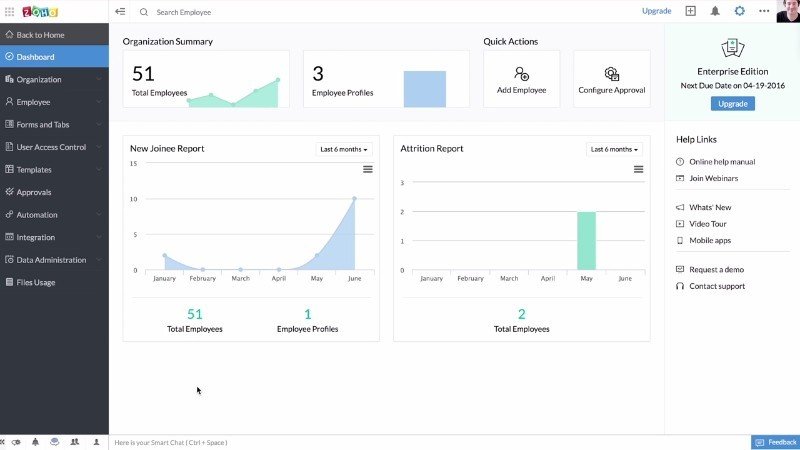
Uniquely Different Features
- AI assistant “Zia” that answers HR questions in natural language.
- 500+ integrations across HRMS, payroll management software for small business, and other apps.
- Drag-and-drop dashboard builder for human resource management software for small business.
Pros and Cons
Pros | Cons |
Budget-friendly for startups and small teams. | Not purpose-built HRIS system—needs integrations. |
AI assistant simplifies analytics queries. | Limited advanced forecasting features. |
Strong integrations with payroll, HRMS, and HR software for small companies. | May require technical setup for full use. |
Here you go! Now that we have got a detailed analysis of the 10 Best HR Analytics Software for Small Businesses, let us get an overall comparison tabular representation of each HR Analytics Software.
Final Master Comparison Table for all 10 HR Analytics Software
For your ease of understanding and proper comparison between the best HR Analytics Software, we have curated a table for overview purposes.
Software | Key Features | Pros | Cons |
Zimyo | HRMS, payroll, performance, engagement, dashboards | All-in-one, mobile app, affordable | Smaller global presence, limited enterprise integrations |
BambooHR | Benefit & payroll history, dashboards | Easy-to-use, strong analytics | Expensive, limited predictive analytics |
Rippling | HR + payroll + IT, 500+ integrations | Full-suite, automation, mobile-friendly | Complex for small teams, support limited |
Gusto | Payroll, benefits, tax compliance | Simple, integrated, startup-friendly | U.S.-only, limited analytics |
intelliHR | Performance mgmt, engagement analytics | Affordable, easy adoption | Limited payroll, fewer integrations |
ChartHop | Org charts, “what-if” planning | Great visualization & diversity analytics | Limited payroll, needs integration |
Crunchr | DEI, pay equity, predictive analytics | Strong workforce insights | Not full HRMS, higher learning curve |
Visier People | Attrition forecasting, benchmarking | Advanced analytics & reports | Expensive, requires clean data |
Microsoft Power BI | AI dashboards, natural-language Q&A | Flexible, affordable, customizable | Not dedicated HRIS, setup needed |
Zoho Analytics | AI assistant, 500+ integrations | Budget-friendly, strong dashboards | Not full HRIS, advanced forecasting limited |
Unique Benefits of Using HR Analytics Software for Small Businesses
Here are some of the Prominent and Unique Benefits of Using HR Analytics Software for Small Businesses:
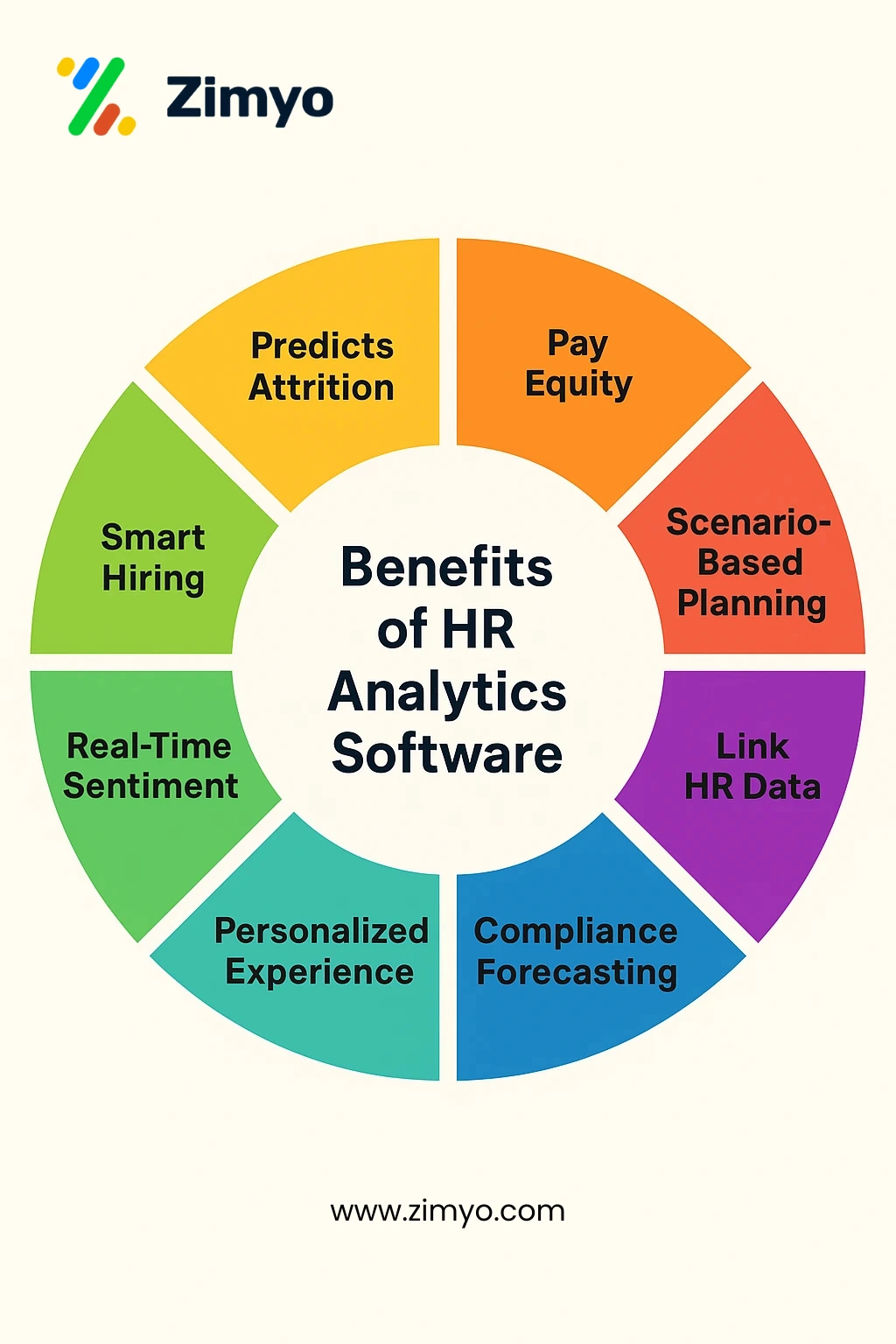
Now, let us understand each one of these unique benefits of HR Analytics Software in detail.
1. Predicts Employee Attrition Before It Happens
HR Analytics Software uses historical data, performance reviews, and engagement trends to flag employees who might leave. This lets businesses proactively retain top talent, something traditional HR systems for small businesses can’t do.
2. Pay Equity and Diversity Insights
Unlike generic HR Software, modern analytics tools highlight pay gaps across gender, age, or department. This helps small companies maintain fairness, compliance, and build a stronger employer brand.
3. Scenario-Based Workforce Planning
Advanced HRIS system tools like ChartHop or Crunchr allow “what-if” modeling. For example, you can test the impact of hiring 10 new sales reps versus 5 developers and instantly see the cost, productivity, and payroll effects.
4. Linking HR Data With Business Outcomes
Instead of just tracking leave or payroll, HRMS human resource management system platforms can link HR metrics (like training hours) directly to business outcomes (like sales growth). This makes HR a profit driver, not just an admin function.
5. Compliance Forecasting
Some HR and payroll software for small business can predict when your workforce may fall out of compliance (e.g., overtime limits, minimum wage changes, benefits eligibility) before penalties occur.
6. Personalized Employee Experience
By analyzing engagement survey data, human resources software for small business can suggest personalized learning paths, recognition opportunities, or even team restructuring, something manual HRIS for small business cannot replicate.
7. Real-Time Sentiment Tracking
Some tools track employee mood and feedback in real time. This helps spot burnout, stress, or disengagement weeks before it shows in performance reviews.
8. Smart Hiring Forecasts
HR analytics software doesn’t just store resumes; it predicts what kind of candidates are most likely to succeed based on past hires’ performance, tenure, and cultural fit.
9. Financial Planning with HR Data
Unlike typical payroll management software for small business, analytics tools connect HR budgets (salary, benefits, overtime) with overall company financial planning, allowing better forecasting and resource allocation.
Conclusion
Choosing the right HR Analytics Software is one of the most important steps for any small business. The right platform doesn’t just help with payroll management software for small business or attendance tracking, it transforms raw data into insights that improve employee performance, engagement, and compliance.
Frequently Asked Questions (FAQs)
What is the best HR software for a small business?
The best HR software for a small business depends on your specific needs, but tools like Zimyo, BambooHR, and Gusto are often considered the Best Hr Analytics Software For Small Businesses. These platforms offer features for payroll, performance management, attendance tracking, and people analytics. Using a complete human resource management software for small business or HRMS human resource management system can help even a small team handle HR efficiently. Startups and small companies benefit most from HR Software for Small Businesses and HR software for startups because they combine HR technology with simple dashboards, HRIS system features, and mobile apps, making HR management easier and faster.
What are the 4 types of HR analytics?
In modern HR Analytics Software, there are mainly four types of analytics. Descriptive analytics shows what has happened in the past using data from your HR system or human resources software for small business. Diagnostic analytics looks into why something happened, such as turnover trends in your HRIS for small business. Predictive analytics forecasts future trends, like potential employee attrition, using your HR software for small companies or HRMS human resource management system. Finally, prescriptive analytics suggests actions you can take to improve outcomes, which is available in advanced HR and payroll software for small business or HR technology platforms.
How much does HR software cost for a small business?
The cost of HR Software for Small Businesses varies depending on the features you need. Basic HR systems for small businesses or HRIS system plans can start at a low monthly fee per employee, while full human resource management software for small business or HRMS human resource management system with payroll, analytics, and engagement tools can cost more. Platforms like Zimyo and intelliHR are designed to be affordable for startups and small companies, while tools like Visier People or ChartHop may have higher prices because they offer advanced HR analytics software features. The key is to choose best small business HR software that balances your budget with the features your team needs.
Which software is mostly used in the HR department?
Many HR departments in small and mid-sized companies use HR Software for Small Businesses like BambooHR, Gusto, Rippling, and Zimyo because they cover most HR needs in one platform. These HR software for small companies provide payroll, attendance, performance, and analytics in one system, which makes them popular. Larger companies may also use HRIS system or HRMS human resource management system like Visier People for advanced analytics. Overall, the most commonly used human resources software for small business combines HR technology, HRIS, and HR system functions to make day-to-day HR work easier, faster, and more accurate.


